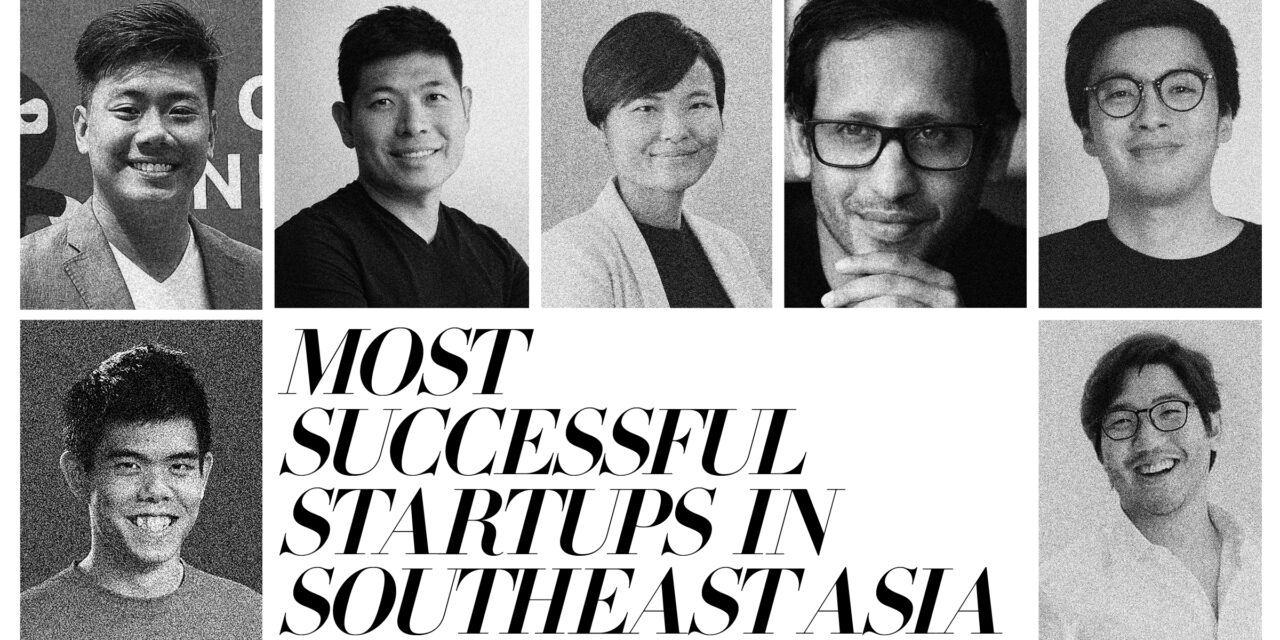A great invention or idea does not just pop up, it has to have come from someone. Most times, these people are those who will bring about changes in the world. Like how Google, Amazon, and Apple started out in the founders’ room, eventually it will turn out to be one of the greatest inventions in human history. Have you ever wondered how big companies get their start? Or maybe you are curious about who are the brains behind these companies that make our lives easier? Here, we have listed five companies and the people behind the success.
Grab

Grab Holdings Inc., commonly known as Grab, was founded by two Malaysians in 2012. It is a South East Asian technology company headquartered in Singapore and Indonesia. The company also offers food delivery and digital payments services via a mobile app. Grab started out as the MyTeksi app based in Kuala Lumpur. The following year, it expanded as GrabTaxi. In 2014, the company moved its headquarters to Singapore and rebranded as ‘Grab’.
Like how Uber is to the United States, so is Grab to Malaysia. The idea of creating a taxi-booking mobile app first came from Anthony Tan while he was at Harvard Business School. Tan launched the ‘MyTeksi’ together with Tan Hooi Ling, another Harvard graduate. Before founding Grab, Tan worked as the Head of Supply Chain and Marketing at Tan Chong Motor Holdings, a company run by his father. While he could have taken over his family’s auto business, he chose to deviate from the family business to start his own. MyTeksi faced various trials during its inception, starting with his co-founder, Tan Hooi Ling having to serve a bond with McKinsey & Company upon graduation, leaving Tan to manage the MyTeksi on his own. At the start, he went door to door knocking on taxis’ drivers windows, trying to persuade taxis drivers to download the app. Not only that, to fully focus on developing MyTeksi, Tan resigned from his post at his father’s company, a move which angered his father, and he refused to finance MyTeksi. On the contrary, Tan’s mother supported his decision and even invested in his business. Tan rebranded MyTeksi to GrabTaxi in 2013 and subsequently expanded Grab to the Philippines, Singapore, and Thailand. The following year, he moved GrabTaxi’s headquarters to Singapore after securing $10 million US dollar funding. In 2016, the company was rebranded to what we know today as Grab. His innovation has earned him multiple awards, including being ranked #38 on Forbes on its 2019 Malaysia’s 50 Richest Net Worth list in 2020.
Tan Hooi Ling, co-founder of Grab, was raised in a middle-class Malaysian Chinese household in Kuala Lumpur. Tan attended the University of Bath and graduated in 2006 with a bachelor’s degree in mechanical engineering. She later graduated from Harvard Business School with a Master of Business Administration in 2011. During her time at Harvard Business School, Tan worked on a business plan with her classmate, Anthony Tan, whom she ultimately founded Grab with, for a “mobile app that connects taxi seekers directly with taxi drivers closest to their location in the chaotic Malaysian urban environment”, which would eventually become GrabTaxi. In 2012, the pair launched the application, MyTeksi. Though the pair started the company together, nonetheless, due to Hooi Ling’s bond with McKinsey & Company as part of the condition for sponsoring her education in Harvard Business School, she had to serve out her bond. She returned to work full-time on Grab in 2015 and took on the title of COO, focusing on three key areas – product, human resources, and customer experience.
Gojek

Gojek is an Indonesian on-demand multi-service platform and digital platform technology group based in Jakarta. It was first established in Indonesia in 2010 as a call centre to connect consumers to courier delivery and two-wheeled ride-hailing services. The company launched its application in 2015 with only four services. Today, it provides more than 20 services.
Gojek was founded by Nadiem Makarim and Kevin Aluwi. Makarim holds degrees from Brown University and Havard Business School. Prior to starting Gojek, he worked at McKinsey and Co. Consulting for three years. He eventually left McKinsey and Co. Consulting to co-found Zalora, in 2011 and became the managing director until 2012. He decided to leave Zalora to focus on his own startup, including Gojek. While developing Gojek, Makarim worked as chief innovation officer of Kartuku, a cashless payment solution, which was later acquired by Gojek to strengthen GoPay. Now, Makarim serves as the Minister of Education and Culture under President Joko Widodo in his second term’s cabinet. In October 2019, he resigned from his position as CEO to join president-elect Jokowi’s Onward Indonesia Cabinet and was replaced by Gojek group president Andre Soelistyo and Gojek co-founder Kevin Aluwi as co-CEOs. On the second reshuffle of the cabinet, Makarim was appointed as the first holder of Minister Education, Culture, Research, and Technology. Makarim has received many accolades and recognition internationally and locally. In 2018, Makarim made it to Bloomberg 50 annual list of innovators. He was also the only Indonesian to be included on the 100 Next list for Leaders category by the Time magazine.
As for Kevin, he holds a bachelor’s degree in Corporate Finance, Entrepreneurship and International Relations from the University of Southern California – Marshall School of Business in Los Angeles, California, USA. Before joining Gojek, Kevin worked in Zalora Indonesia for two years as Head of Business Intelligence. Before Zalora, Kevin was the Business Development Manager in Merah Putih. Inc,; following his start as an Investment Banking analyst in Salem Partners LLC. Since co-founding Gojek, Kevin has held a strategic role in adopting business intelligence data to track and optimise critical elements such as pricing, driver-partners income, as well as in structuring customers retention strategy. He was listed in ‘Forbes 30 Under 30 Asia’ in the Consumer technology category in 2016.
Pomelo Fashion

Pomelo was launched in 2013 and it is South East Asia’s leading fashion platform with a global mindset: on-trend, online, on-the-go. It was founded by David Jou and Casey Liang, and it is a Bangkok-based online retail company, which focuses on products that are produced in Asia. The company not only sells clothes for women, but it also designs, sources materials, researches fashion trends, delivers goods to its customers and many more. When the company designs clothes, it designs the clothes with Asian market in mind. Bearing the Asian market in mind, it considers the size and shape of the average consumers. The climate of South East Asia plays an important part in the designs of the clothes.
David Jou is currently the CEO of Pomelo Fashion. Under his leadership, the company has become one of Thailand’s most popular digital fast fashion brands. Pomelo now has offices around South East Asia’s region, such as Thailand, Indonesia, and Singapore, catering to customers in 44 countries from their Hong Kong warehouse. Prior to Pomelo, he co-founded Lazada Thailand, where he served as the managing director. During his tenure, Lazada Thailand became one of the leading online shopping sites in Thailand. Believe it or not, prior to founding Pomelo, Jou started his first company, The Boxing Co. in 2003 while he was studying in Amherst College Massachusetts. The company’s main service is providing shipping and storage services for American University students. Upon graduating, he joined Bain & Co. in New York, eventually transferring to a private equity investment firm with New Mountain Capital, New York.
Carousell

Carousell is an online platform where it works as a marketplace for buying and selling new and secondhand goods. It is based in Singapore, but also operates in Malaysia, Indonesia, the Philippines, Cambodia, Taiwan, Hong Kong, Macau, Australia, New Zealand and Canada. It started a decade ago by Quek Siu Rui, Lucas Ngoo and Marcus Tan, where Quek and Ngoo are currently the CEO and CTO respectively. Carousell started its humble journey by selling an Amazon Kindle e-reader for S$75. It was subsequently registered as Carousell Pte. Ltd. in 2013. The company received various investments and fundings from multiple corporations and as of 2016, over 23 million items have been sold on Carousell and users had created over 57 million listings of new and used items for sale. The platform has been recognised as the pioneer of mobile-first platform that emerged at the rise of the smartphone trend and in 2018, it was valued at $500 million.
The idea for Carousell came about when Quek tried to sell his old Macbook. He found traditional forums and classified ads troublesome and looked for a better alternative. Quek, Ngoo and Tan then came up with ‘Snapsell’ – a virtual flea market where users can easily buy and sell second-hand items. The idea were pitched during the Singapore Startup Weekend in March 2012. The idea for Snapsell almost did not make the cut for the one-minute pitch for 40 ideas and that they fell short again for the final pitch. However, things were in their favour when some of the teams dropped out, hence they were able to make it to the final round of pitching. The team spent 54-hours battling stubborn code and went on to win the top prize at Startup Weekend. They won their own office space at Blk 71, a startup ecosystem at Ayer Rajah Crescent. The team also had a chance to pitch at Angel’s Gate where they could gather investors and funding. The name ‘Carousell’ was inspired from the television Mad Men, where Don Draper was pitching the Kodak Carousel. The trio adopted the name, adding an additional ‘l’ at the back to link back to the idea of selling. For three months, Quek and his co-founders spent every weekend visiting flea markets where they gathered feedbacks from sellers and shoppers. Out of the 100 flea markets sellers they approached, 70 sellers were sold on the idea of Carousell. After four months’ preparation, the platform was officially launched on 13 August 2012. During the first 18 months after Carousell was first launched, Quek and his co-founders went without salaries and had to convince their parents to support their startup idea. Quek was offered US$100 million to sell Carousell but he refused the offer, taking inspiration from Mark Zuckerberg who declined to sell Facebook in its early days. Quek was featured on Forbes Asia 30 Under 30 List for his achievements with Carousell.
Ninja Logistic

Ninja Logistic, or rather, Ninja Van is not a foreign name in Malaysia. It is a Singapore Logistic company founded in 2014 by Singaporeans Lai Chang Wen, Shaun Chong, and TanBoxian. The company engages in last mile logistics and package delivery. Unlike other companies such as GOGOX and Lalamove that use a point-to-point model, Ninja Van runs on a hub-and-spoke model, which plans routes for the drivers and optimises delivery. In 2019, the firm delivered an average of one million parcels a day around the Asean region. During the Covid-19 pandemic in 2020, Ninja Van saw a three-fold increase in parcel volume in Singapore, whereas in Malaysia, it saw a two-fold increase in shipment volume growth, driven by the growth in social-commerce transactions.
Lai Chang Wen is the co-founder and CEO of Ninja Van. Prior to founding Ninja Van, he worked as a derivatives trader at Barclays before setting up men’s custom fashion retailer Marcella. His time in the online retail business made him realised that there could be a more efficient way of delivering and tracking packages, which sparks the idea of Ninja Van, and the rest is history. Lai was listed on Forbes 2016 30 Under 30 Asia List. In March 2015, Lai raised $2.5 million in Series A funding from Monk’s Hill Ventures, which is used to accelerate expansion into Malaysia and Indonesia. In a recent interview with Forbes Asia, Lai stated that Ninja Van’s revenue has been growing at 40 percent to 50 percent annually, largely thanks to the e-commerce boom. The company has recently opened an 80,000 square foot automated parcel sorting hub in Singapore to cope with the surging volumes and speed up deliveries.










